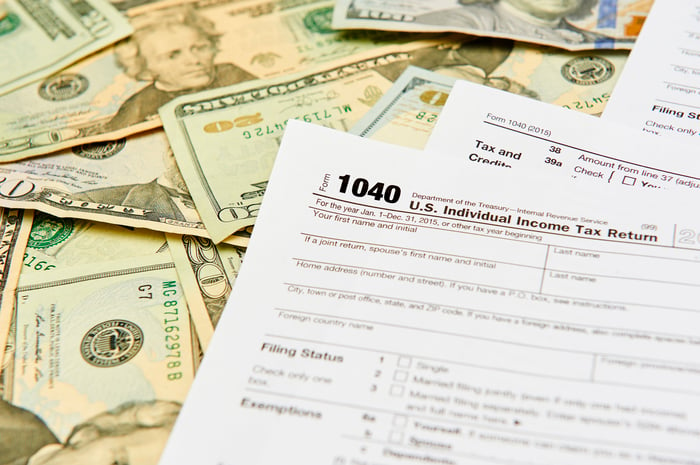When the IRS pushed back the tax-filing deadline from April 15 to May 17, procrastinators everywhere had reason to celebrate. But now, here we are in May, and the tax deadline will be here before we know it. With that in mind, here are a few things you can do to ensure that the filing process goes smoothly.
1. Do your taxes electronically
If you're used to filing a paper return, you may be inclined to go that route once again. But this really isn't the year to do your taxes on paper. As of about a week ago, the IRS was holding 29 million paper tax returns that need to be manually processed. Since the agency is stretched thin, going through paper returns is taking longer than it usually does, which means taxpayers who are due a refund could experience serious delays in getting their money if they don't submit an electronic return.

Image source: Getty Images.
Remember, too, that even in a normal year, it takes the IRS about twice as long to issue refunds for paper returns as it does to issue refunds for electronic ones. Plus, another benefit of submitting your taxes electronically is that you're less likely to make a mistake that could delay your refund even more.
2. Don't wait till the very last minute
At this point, you might think you still have plenty of time to get your 2020 taxes done. But the last thing you want to do is rush through the process and make an error or lose out on valuable tax breaks in the process.
Remember, if your income declined in 2020, which was the case for a lot of people, you may be entitled to credits you were never eligible for in previous tax years. Also, there are new nuances to navigate this year, like the fact that up to $10,200 of unemployment income from 2020 may be yours to enjoy tax-free. As such, be sure to give yourself enough time to tackle your return.
3. Don't guess at deductions
Guessing at tax deductions is a great way to get your return audited. There's absolutely nothing wrong with claiming tax breaks you're entitled to, but you'll need receipts to back up those numbers in case the IRS comes asking. And if you estimate your deductions and submit a series of clean, round numbers, the IRS might get suspicious.
4. File a return even if you normally don't
Some lower-income people aren't obligated to file a tax return. But it could pay to submit one for 2020 nonetheless. If you didn't receive a stimulus check last year, the only way to get that money at this point is to claim the Recovery Rebate Credit on your 2020 return, and that could put a nice amount of money in your pocket. Plus, if you don't file a tax return for 2020, the IRS may not realize that you're eligible for one of the $1,400 stimulus checks that are still going out today.
Filing taxes doesn't have to be a complicated process. Follow these tips for an easy, stress-free return, and prepare to breathe a sigh of relief once your taxes are done with.




